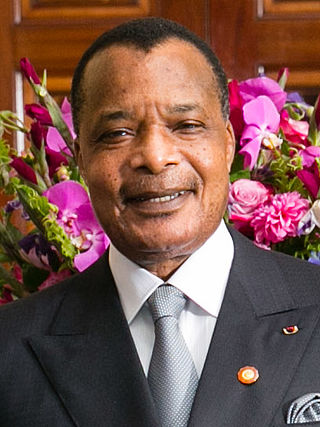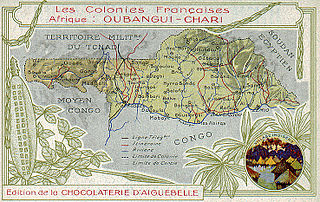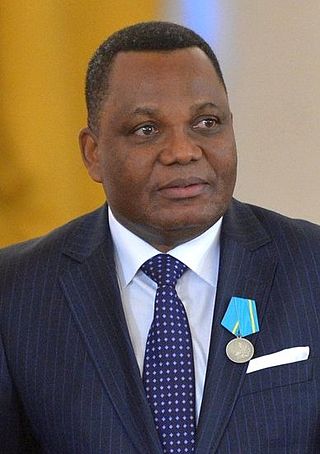
The history of the Republic of the Congo has been marked by diverse civilisations: indigenous, French and post-independence.

Marien Ngouabi was the third President of the Republic of the Congo from January 1, 1969, to March 18, 1977.

Pascal Lissouba was a Congolese politician who was the first democratically elected President of the Republic of the Congo and served from 31 August 1992 until 25 October 1997. He was overthrown by the former and current President Denis Sassou Nguesso in the 1997 civil war.

Denis Sassou Nguesso is a Congolese politician and former military officer. He became president of the Republic of the Congo in 1997. He served a previous term as president from 1979 to 1992. During his first period as president, he headed the Congolese Party of Labour (PCT) for 12 years. He introduced multiparty politics in 1990, but was stripped of executive powers by the 1991 National Conference, remaining in office as a ceremonial head of state. He stood as a candidate in the 1992 presidential election but placed third.
Jacques Joachim Yhombi-Opango was a Congolese politician. He was an army officer who became Congo-Brazzaville's first general and served as Head of State of the People's Republic of the Congo from 1977 to 1979. He was the President of the Rally for Democracy and Development (RDD), a political party, and served as Prime Minister from 1993 to 1996. He was in exile from 1997 to 2007.

The Congolese Party of Labour is the ruling party of the Republic of the Congo. Founded in 1969 by Marien Ngouabi, it was originally a pro-Soviet, Marxist–Leninist vanguard party which founded the People's Republic of the Congo. It took a more moderate left-wing stance following the dissolution of the Soviet Union in 1991 and adopted social democracy as its principal ideology in 2006. Denis Sassou Nguesso is the President of the PCT Central Committee, and Pierre Moussa is the Secretary-General of the PCT.

Alphonse Massamba-Débat was a political figure of the Republic of the Congo who led the country from 1963 until 1968 in a one-party system.

The People's Republic of the Congo was a Marxist–Leninist socialist state that existed in the Republic of the Congo from 1969 to 1992.

André Ntsatouabantou Milongo was a Congolese politician who served as Prime Minister of the Republic of the Congo from June 1991 to August 1992. He was chosen by the 1991 National Conference to lead the country during its transition to multiparty elections, which were held in 1992. He was also the founder and President of the Union for Democracy and the Republic (UDR-Mwinda), a political party. From 1993 to 1997, he was President of the National Assembly, and he was again a deputy in the National Assembly from 2002 to 2007.
Stéphane Maurice Bongho-Nouarra was a Congolese politician. He served in the government of Congo-Brazzaville during the late 1960s, and after a long period in exile, he returned and played an important role in the politics of the 1990s. Bongho-Nouarra was briefly Prime Minister of Congo-Brazzaville from September 1992 to December 1992.
Ambroise Édouard Noumazalaye was a Congolese politician who was Prime Minister of Congo-Brazzaville from 1966 to 1968, under President Alphonse Massamba-Débat. Later in life he served as Secretary-General of the Congolese Labour Party (PCT) and was a supporter of President Denis Sassou Nguesso. He served as President of the Senate from 2002 to 2007.

Marien Ngouabi University is the only state-funded university in the Republic of Congo. It is located in the capital of Brazzaville.

The Saint-Sylvestre coup d'état was a coup d'état staged by Jean-Bédel Bokassa, commander-in-chief of the Central African Republic (CAR) army, and his officers against the government of President David Dacko on 31 December 1965 and 1 January 1966. Dacko, Bokassa's cousin, took over the country in 1960, and Bokassa, an officer in the French army, joined the CAR army in 1962. By 1965, the country was in turmoil—plagued by corruption and slow economic growth, while its borders were breached by rebels from neighboring countries. Dacko obtained financial aid from the People's Republic of China, but despite this support, the country's problems persisted. Bokassa made plans to take over the government; Dacko was made aware of this, and attempted to counter by forming the gendarmerie headed by Jean Izamo, who quickly became Dacko's closest adviser.
Bernard Bakana Kolélas was a Congolese politician and President of the Congolese Movement for Democracy and Integral Development (MCDDI). Kolélas was a long-time opponent of the single-party rule of the Congolese Labour Party (PCT), and after the introduction of multiparty politics in the early 1990s he was one of Congo-Brazzaville's most important political leaders. He placed second in the August 1992 presidential election, behind Pascal Lissouba; subsequently he was mayor of Brazzaville, the capital, during the mid-1990s, and he briefly served as Prime Minister of Congo-Brazzaville during the 1997 civil war. After rebel forces prevailed in the civil war, he lived in exile for eight years until an amnesty made it possible for him to return; he was then elected to the National Assembly in 2007.
Ange Diawara was a politician and military figure from the Republic of the Congo.

The Republic of the Congo, also known as Congo-Brazzaville, the Congo Republic or simply either Congo or the Congo, is a country located on the western coast of Central Africa to the west of the Congo River. It is bordered to the west by Gabon, to its northwest by Cameroon and its northeast by the Central African Republic, to the southeast by the Democratic Republic of the Congo, to its south by the Angolan exclave of Cabinda and to its southwest by the Atlantic Ocean.

Jean-Claude Gakosso is a Congolese politician who has served in the government of Congo-Brazzaville as Minister of Foreign Affairs since 2015. Previously he was Minister of Culture and the Arts from 2002 to 2015.
Pierre Anga was a Congolese army officer and rebel leader who was an opposition figure to Congolese President Denis Sassou-Nguesso. He formed part of the Military Committee of the Congolese Labour Party which for the period between 18 March 1977 to 3 April 1977 acted in place of the Presidency after Marien Ngouabi was assassinated. Anga was arrested in 1987 for allegedly participating in a coup d'état against the President; during this arrest several soldiers were killed. Shortly after this coup attempt fighting broke out in the North of the country between forces led by Anga and Government forces. He was killed by Congolese security forces. He is reported to have died in the jungle of Ikongono.

M 22 was a political movement in Congo-Brazzaville. It was active in 1972 and 73 before its guerrilla base was compromised and most of its cadre arrested including its leader Ange Diawara.

Aloïse Moudileno-Massengo was the first Congolese lawyer in France. He later became a minister in the Republic of the Congo under Alphonse Massamba-Débat and then Marien Ngouabi, as well as serving as Vice-President of the Republic of the Congo.














